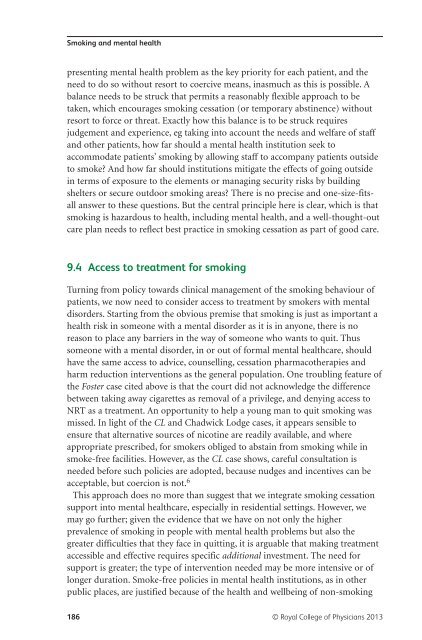Smoking and mental health - NCSCT
Smoking and mental health - NCSCT
Smoking and mental health - NCSCT
You also want an ePaper? Increase the reach of your titles
YUMPU automatically turns print PDFs into web optimized ePapers that Google loves.
<strong>Smoking</strong> <strong>and</strong> <strong>mental</strong> <strong>health</strong><br />
presenting <strong>mental</strong> <strong>health</strong> problem as the key priority for each patient, <strong>and</strong> the<br />
need to do so without resort to coercive means, inasmuch as this is possible. A<br />
balance needs to be struck that permits a reasonably flexible approach to be<br />
taken, which encourages smoking cessation (or temporary abstinence) without<br />
resort to force or threat. Exactly how this balance is to be struck requires<br />
judgement <strong>and</strong> experience, eg taking into account the needs <strong>and</strong> welfare of staff<br />
<strong>and</strong> other patients, how far should a <strong>mental</strong> <strong>health</strong> institution seek to<br />
accommodate patients’ smoking by allowing staff to accompany patients outside<br />
to smoke? And how far should institutions mitigate the effects of going outside<br />
in terms of exposure to the elements or managing security risks by building<br />
shelters or secure outdoor smoking areas? There is no precise <strong>and</strong> one-size-fitsall<br />
answer to these questions. But the central principle here is clear, which is that<br />
smoking is hazardous to <strong>health</strong>, including <strong>mental</strong> <strong>health</strong>, <strong>and</strong> a well-thought-out<br />
care plan needs to reflect best practice in smoking cessation as part of good care.<br />
9.4 Access to treatment for smoking<br />
Turning from policy towards clinical management of the smoking behaviour of<br />
patients, we now need to consider access to treatment by smokers with <strong>mental</strong><br />
disorders. Starting from the obvious premise that smoking is just as important a<br />
<strong>health</strong> risk in someone with a <strong>mental</strong> disorder as it is in anyone, there is no<br />
reason to place any barriers in the way of someone who wants to quit. Thus<br />
someone with a <strong>mental</strong> disorder, in or out of formal <strong>mental</strong> <strong>health</strong>care, should<br />
have the same access to advice, counselling, cessation pharmacotherapies <strong>and</strong><br />
harm reduction interventions as the general population. One troubling feature of<br />
the Foster case cited above is that the court did not acknowledge the difference<br />
between taking away cigarettes as removal of a privilege, <strong>and</strong> denying access to<br />
NRT as a treatment. An opportunity to help a young man to quit smoking was<br />
missed. In light of the CL <strong>and</strong> Chadwick Lodge cases, it appears sensible to<br />
ensure that alternative sources of nicotine are readily available, <strong>and</strong> where<br />
appropriate prescribed, for smokers obliged to abstain from smoking while in<br />
smoke-free facilities. However, as the CL case shows, careful consultation is<br />
needed before such policies are adopted, because nudges <strong>and</strong> incentives can be<br />
acceptable, but coercion is not. 6<br />
This approach does no more than suggest that we integrate smoking cessation<br />
support into <strong>mental</strong> <strong>health</strong>care, especially in residential settings. However, we<br />
may go further; given the evidence that we have on not only the higher<br />
prevalence of smoking in people with <strong>mental</strong> <strong>health</strong> problems but also the<br />
greater difficulties that they face in quitting, it is arguable that making treatment<br />
accessible <strong>and</strong> effective requires specific additional investment. The need for<br />
support is greater; the type of intervention needed may be more intensive or of<br />
longer duration. Smoke-free policies in <strong>mental</strong> <strong>health</strong> institutions, as in other<br />
public places, are justified because of the <strong>health</strong> <strong>and</strong> wellbeing of non-smoking<br />
186 © Royal College of Physicians 2013














